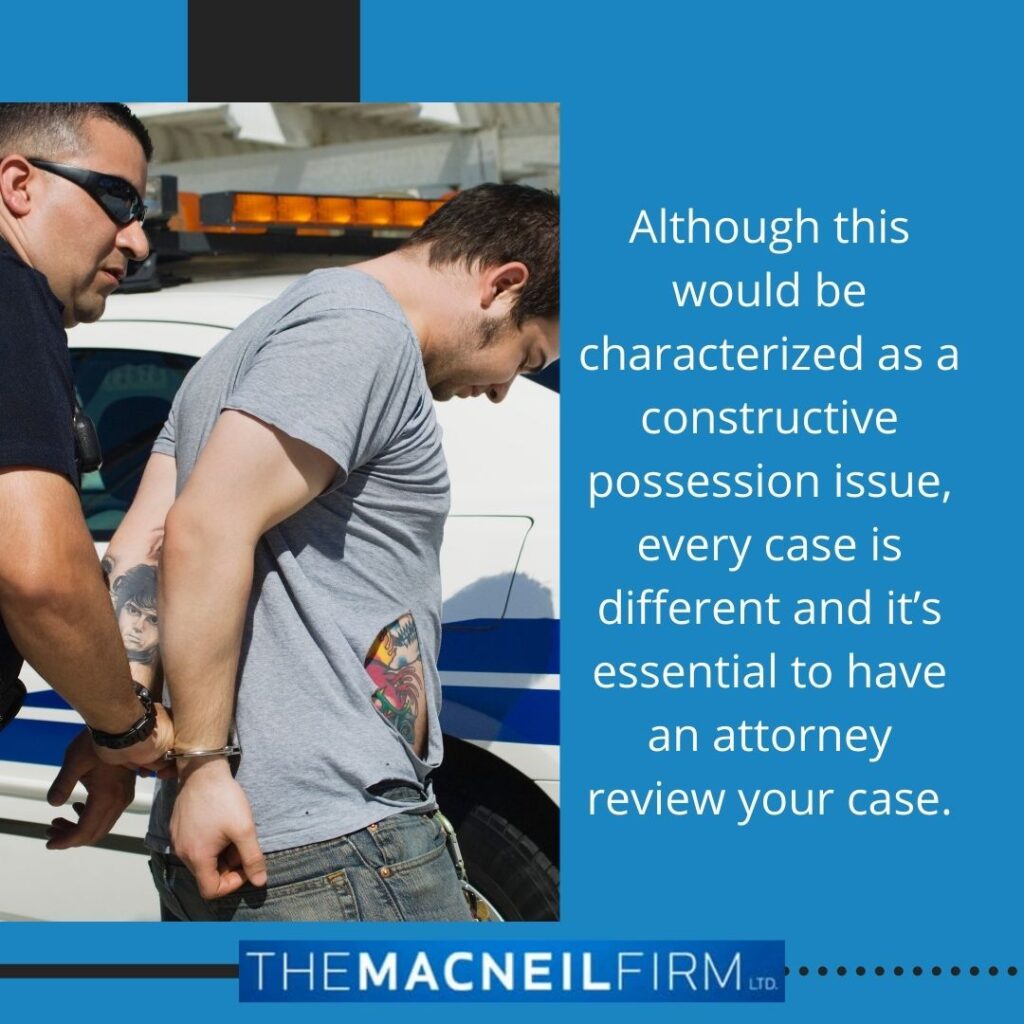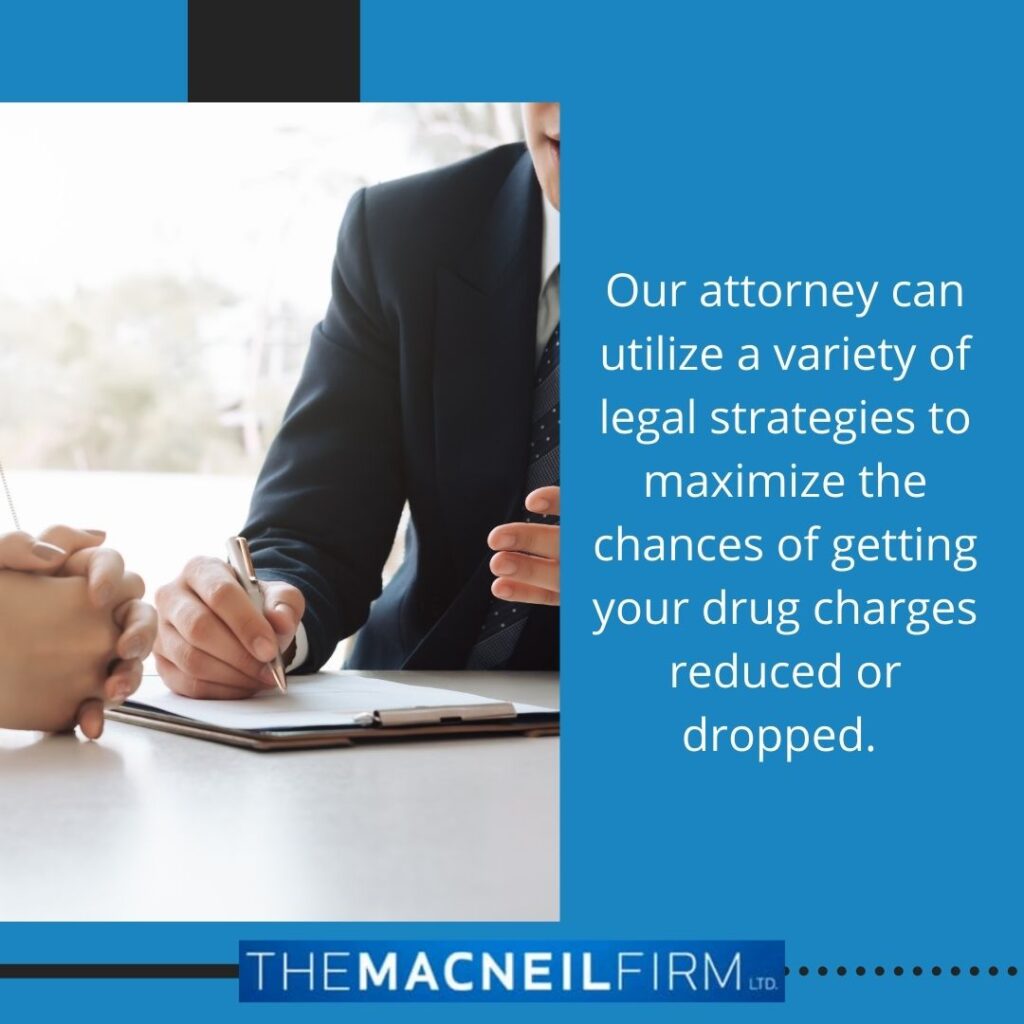If you are a passenger in a vehicle where drugs are discovered, you can be charged for possession. In circumstances like these, our drug lawyers Frankfort Illinois that can mount a strong defense. The team at The MacNeil Firm have a lot of experience with these types of cases and are here to help you. Call us today to request a free consultation at (708) 218-0947.
This is typically will be characterized as a constructive possession issue. But remember, every case is different. It would depend primarily on where the drugs are located. For instance, if you were a passenger in the backseat of a car, the drugs were found in the trunk, and the car belonged to someone else, that is a situation where it may be difficult for them to charge you with possession of those drugs.
If you are sitting in the front passenger seat, and the drugs are underneath your seat, you are more likely to be charged with possession of those drugs. Every case is going to be different. Constructive possession really depends on the facts of each case. This is why I always take my time to discuss the case and go over the police reports with my client, so I can uncover any potential defenses available.
General Timeline Of A Drug Case
When facing drug charges, the first court appearance after an arrest will be for the bond hearing. The only purpose for the bond hearing is for a judge to determine how much money you have to post to get out of jail while your case is pending. I am frequently able to obtain I-bonds, or what they call recognizance bonds, for many of my clients charged with drug offenses. This means that you promise to show up in court, and you do not have to pay any money to be released.
Next is what I call the preliminary stages of the case. Every drug case requires a preliminary showing of probable cause to go forward. This can be done in a preliminary hearing, which would be conducted in an open court, or at a grand jury, which would be done in a secret proceeding in which we are not allowed to participate.
The state’s attorney decides whether they want to have a preliminary hearing, or a grand jury. Drug lawyers Frankfort Illinois do not get to pick. Often there is a finding of probable cause, because it is a very low burden of proof. The state does not have to prove their case beyond a reasonable doubt, like they do when a case goes to trial. All but the very weakest cases have a finding of probable cause and proceed past this part of the case.
After the determination of probable cause by a judge, or an indictment is returned by the grand jury, the case is then assigned to a trial judge. In front of the trial judge, the state is required to turn over all the evidence to us in this case. This is called discovery, and it is how we evaluate every case. Once we have the discovery, which is all the evidence in the case, I will have separate meetings with my clients to discuss the evidence, and make sure that they understand the evidence they are facing.
During a meeting at my office is also where we talk about what their options are, and I will give them the pros and cons of each of those options. Then I will tell them how I think we should proceed with their case, and explain why. From there, you and your drug lawyers Frankfort Illinois will decide what our strategy will be. For example, we may decide we are going to go to trial.
Maybe we think there was an illegal search or seizure, and so we are going to file a motion to quash arrest, and suppress the evidence. Alternatively, perhaps the state has a very strong case against my client, and we are going to agree to negotiate a plea agreement in the case. Every case is different, and every move that I make in the case is with the knowledge, and the consent of my client, after we have discussed the case thoroughly.
Our drug lawyers Frankfort Illinois will do what we can to get your charges reduced or dropped
Your attorney can utilize a variety of legal strategies to maximize the chances of getting your drug charges reduced or dropped. They can argue that you did not actually “possess” the drug, maintaining that you did not have actual or constructive possession of the substance.
Actual possession means that you have immediate access to a controlled substance or have it on your person. Constructive possession means that you don’t necessarily have immediate access to the drug, but you do have control over it. If your drug lawyers Frankfort Illinois are able to show that you did not have actual or constructive possession of a drug, it is likely that your case will be dropped.
Your lawyer can also help you get your drug possession case dismissed by getting you into a drug treatment program, displaying a valid prescription for the drug, proving that you had no knowledge that the drug was a “controlled substance,” and demonstrating that law enforcement violated your constitutional rights.
Penalties for a Drug Conviction in Illinois
With the exception of cannabis and marijuana, all drug cases in Illinois are felonies, and the general rule is, as the weight of the drugs go up, so do the penalties. For example, possession, just a straight possession, in the personal use quantity would be a Class 4 felony, and go up from there depending on the amount. A Class 4 felony in Illinois carries probation and up to one to three years in prison. There are also certain first offender probation options that may be available to someone that has no criminal background, which would avoid a felony conviction and be eligible for an expungement later.
Possession with the intent to deliver would start as a Class 1 felony, and would increase the class of felony as the weight increases. A Class 1 felony, possession with intent to deliver can receive a sentence of probation, but it also can carry up to four to fifteen years in prison. Delivery generally will start as a Class X felony, which does not include probation. It is a mandatory six to thirty years in prison with no eligibility of probation. Trafficking is one of the most serious drug offenses in Illinois. It is what is commonly referred to as Super Class X felony. Generally, that is a mandatory twelve years up to sixty years in prison.
For more information on Drugs And Passengers In A Vehicle, a free initial consultation is your next best step. Get the information and legal answers you are seeking by calling our drug lawyers Frankfort Illinois at The MacNeil Firm today. (708) 218-0947.



